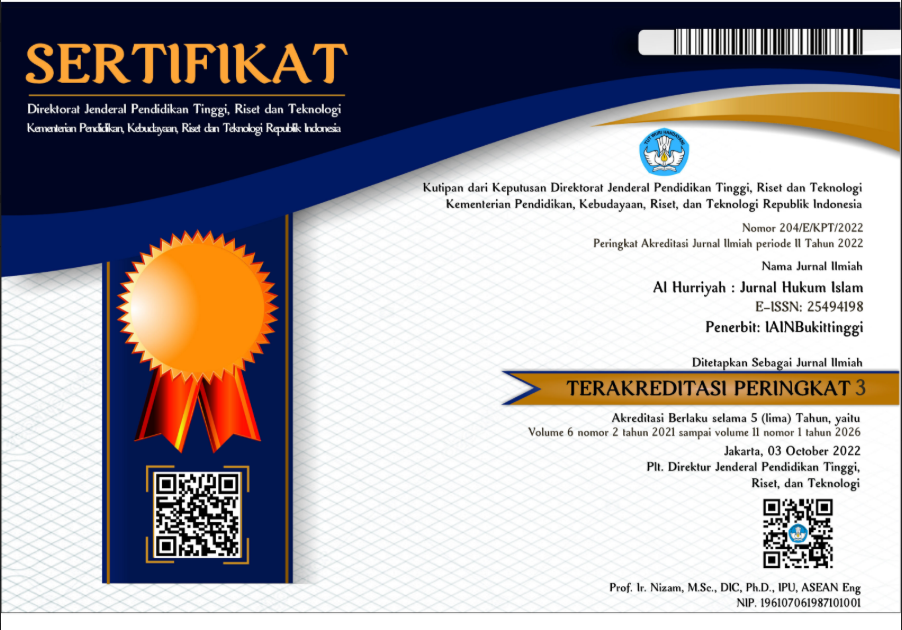Legal Children in Pregnant Marriage: A Juridical Analysis of Indonesian Positive Law
DOI:
https://doi.org/10.30983/alhurriyah.v7i2.5321Keywords:
KHI, Circular, Marriage Registration,Abstract
References
Agama, Departemen. Al-Qur’an Dan Terjemahannya. Jakarta: CV. Nala Dana, 2007.
Basri, Cik Hasan. Peradilan Islam Dalam Tatanan Masyarakat Indonesia. Bandung: PT. Remaja Rosdakarya, 1997.
Edyar, Busman. “Status Anak Luar Nikah Menurut Hukum Positif Dan Hukum Islam Pasca Keluarnya Putusan MK Tentang Uji Materiil Undang Undang Perkawinan.†Al-Istinbath : Jurnal Hukum IslamJurnal Hukum Islam 1, no. 2 (2016): 181–208. http://journal.iaincurup.ac.id/index.php/alistinbath/article/view/115.
Endang Darini Asdi. Pidato Pengukuhan Guru Besar Ilmu Hukum. Yogyakarta: Kreasi Total Media, 2008.
Fauzi, Fahrul. “Tinjauan Kawin Hamil Dalam Perspektif Hukum Islam.†Journal of Islamic Law Studies 3, no. 2 (2021): 22. https://scholarhub.ui.ac.id/jilsAvailableat:https://scholarhub.ui.ac.id/jils/vol3/iss2/7.
Febriansyah, Eddo. “Tinjauan Yuridis Putusan Mahkamah Konstitusi Nomor 46/Puu–Viii/2010 Tentang Kedudukan Anak Diluar Nikah Yang Diakui Dalam Pembagian Warisan.†Unnes of Law Journal - Jurnal Hukum Universitas Semarang 4, no. 1 (2015): 1–19.
Gunawan, Edi. “Eksistensi, Kompilasi, Hukum Islam,†2006, 1–15.
Harahap, Yahya. Materi Kompilasi Hukum Islam. Yogyakarta: UII Press, 1991.
Miles, Matthew B. Analisis Data Kualitatif. Jakarta: UI Press, 2009.
Mutaqien. Peradilan Agama Dan Kompilasi Hukum Islam Dalam Tata Hukum Indonesia. Yogyakarta: UI Press, n.d.
Pusvita, Sari. “Keperdataan Anak Diluar Nikah Dalam Putusan Mahkamah Konstitusi Dan Implikasinya Terhadap Harta Warisan.†Ulul Albab: Jurnal Studi Dan Penelitian Hukum Islam 1, no. 2 (2018): 31–51. https://doi.org/10.30659/jua.v1i2.2338.
Ramadhita, and Ahmad Farahi. “Keadilan Bagi Anak Luar Kawin Dalam Putusan Mahkamah Konstitusi Nomor 46/PUU-VIII/2010.†De Jure: Jurnal Hukum Dan Syari’ah 8, no. 2 (2016): 74–83.
Rasyid, Aisyah. “Hukum Perkawinan Nasional Dan Putusan Mk . Nomor 46 Tahun 2010†2, no. 2 (2010): 219–38.
Ratna, Nyoman Kutha. Teori, Metode, Dan Teknik Penelitian Sastra: Dari Strukturalisme Hingga Postrukturalisme Perspektif Wacana Naratif. Yogyakarta: Pustaka Pelajar, 2011.
Rofiq, Ahmad. Hukum Islam Di Indonesia. Jakarta: PT. Raja Grafindo Persada, 2003.
Sadijono. Memahami Beberapa Bab Pokok Administrasi. Yogyakarta: Yaks Bang Pesindo, 2008.
Shirazi. Al Muhadzzhab Fi Fiqhi Al Imam Al Syafr’i. Semarang: Toha Putra, n.d.
Subekti. Pokok-Pokok Hukum Perdata. Jakarta: Instrumen, 2003.
Sumardjo, Dadang Hermawan. “Kompilasi Hukum Islam Sebagai Hukum Meteriil Peradilan Agama.†Yudisia 6 (2015): 25–46.
Wibowo, R. Tetuko Aryo, and Thohir Luth. “Akibat Hukum Anak Yang Dilahirkan Dalam Kawin Hamil.†Jurnal Ilmiah Pendidikan Pancasila Dan Kewarganegaraan 5, no. 2 (2020): 233. https://doi.org/10.17977/um019v5i2p233-240.
Zed, Mestika. Metode Penelitian Kepustakaan. jakarta: Yayasan Obor Indonesia, 2008.
Downloads
Published
How to Cite
Issue
Section
Citation Check
License
Authors who publish with this journal agree to the following terms:
- Authors retain copyright and grant the journal right of first publication with the work simultaneously licensed under a Creative Commons Attribution-ShareAlike 4.0 International License that allows others to share the work with an acknowledgment of the work's authorship and initial publication in this journal.
- Authors are able to enter into separate, additional contractual arrangements for the non-exclusive distribution of the journal's published version of the work (e.g., post it to an institutional repository or publish it in a book), with an acknowledgment of its initial publication in this journal.
- Authors are permitted and encouraged to post their work online (e.g., in institutional repositories or on their website) prior to and during the submission process, as it can lead to productive exchanges, as well as earlier and greater citation of published work (See The Effect of Open Access).





